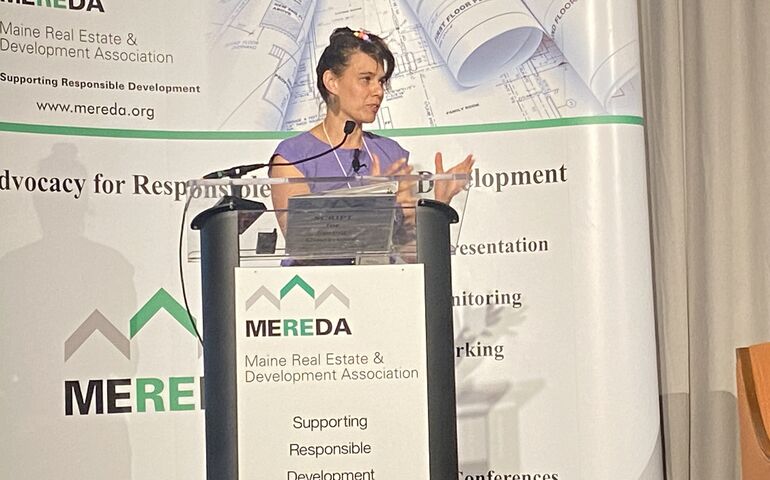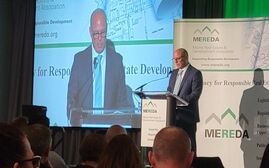MEREDA spring conference: YIMBY advocate pleads for more affordable housing
 Photo / Renee Cordes
Affordable housing advocate Sonja Trauss was the keynote speaker at MEREDA's spring conference, held Thursday in Portland at the Holiday Inn By the Bay.
Photo / Renee Cordes
Affordable housing advocate Sonja Trauss was the keynote speaker at MEREDA's spring conference, held Thursday in Portland at the Holiday Inn By the Bay.
Mainers wanting more affordable housing in their communities need to voice those demands to elected officials, a national YIMBY advocate told a real estate conference in Portland on Thursday.
"It's really important to have regular people speaking up for housing," Sonja Trauss, a community organizer, urban activist and housing advocate who founded and leads a national organization called YIMBY Law, told the MEREDA spring conference in Portland.
YIMBY, short for "Yes in My Backyard," is a pro-housing movement that sprung up in response to development naysayers known as NIMBYists, for "No in My Backyard."
Trauss, a former high school math teacher, serves as executive director of YIMBY Law, the legal arm of the pro-housing movement affiliated with the YIMBY Action network that's grown to 43 chapters in 19 states. YIMBY Law is on a mission to address the housing shortage and achieve affordable, sustainable and equitable housing for all.
When it comes to legislation, Trauss noted that legalizing accessory dwelling units, as Maine did last April via L.D. 2003, is popular and easy but frequently necessitates follow-up legislation to work in practice.
In California, for example, which passed its first state law related to ADUs in 2016, there have been five or 10 bills related to maintenance every year since then, she said.
Warning that the same could happen here after L.D. 2003, she said, "That will be your life going forward."
While the group does not yet have a chapter in Portland, Trauss told attendees that it's open to starting one.
"I think there are regular people who want to support housing out there," she said, "so anytime, just give us a call."
300-plus attendees
More than 300 people attended the half-day event at the Holiday Inn By the Bay, while another 30 tuned in remotely.
"These are pre-pandemic numbers for us," MEREDA President Craig Young said of Thursday's turnout, and noted that one can't discuss development without discussing solutions for Maine's housing crisis.
Economist perspective: 'End of the free-money era'
“Should we stay or should we go?” Paraphrasing the 1980s English rock band the Clash, that’s the state of the current economic environment, said Kenneth Entenmann, a senior vice president, chief investment officer and chief economist at NBT Wealth Management.
Entenmann said the economy’s uncertainty and whether it’s recessionary or not affects the real estate market. Today’s recession could be different from those of the past, given the growth and diversification of the national economy.
“I don’t know that recession is one-size-fits-all,” he said.
At one time, an agricultural recession meant bad times for all. Today, tech layoffs and a banking crisis in California don’t necessarily impact Maine. He said that economists have been predicting a recession for the past couple of years.
In real estate, that translates to sticker shock, with existing-home sales collapsing in recent months, driven largely by rising mortgage rates, such as a 30-year fixed rate mortgage over 7%, he said.
Potential homebuyers waiting for the interest rate to recede to below 3% are in for a long haul, he predicted. He added that 7% is actually a return to normal. The rate hike is the Federal Reserve’s fastest “in the history of the world,” he said.
“Very low rates was the abnormal period,” he said. “I think you’ll see the cost of capital go up. That’s something you folks need to worry about. It’s the end of the free-money era.”
Lack of supply is driving up prices. Single family homes starts boomed during the pandemic and are still needed, but there will be a credit crunch because banks aren’t going to lend as much as they have before — which will squelch off real estate.
Housing perspective: Changing regulatory environment
From the perspective of housing development, the regulatory environment is far different today than past years, said Pierce Atwood attorney Elizabeth Frazier.
Historically, she said, municipalities have the been the drivers of land-use policy. The state’s interest in land use began to emerge in the 1960s, to address issues such as public health and safety and environmental protection. Other issues emerged, such as the prevention of sprawl.
“Human connectivity started to change the pure local nature of housing and land use,” she said.
The assumption that single-family subdivisions would be the future of housing in Maine began to shift. Policy standards were strengthened at a time when there wasn’t tremendous demand for development and not a lot of people were moving to Maine.
For 20 years, until 2020, only 16% of the homes in Maine were newly built — a small margin compared with the overall number of homes, Frazier said.
In-migration during the pandemic changed all that.
Today, the state’s interest has changed, with new concerns around affordability, supply and homelessness.
The state legislature is tackling these new issues, Frazier said. The last legislature, she noted, began to look at reducing barriers to development by creating new policies such as the ability to put more housing units on lots located in growth zones, density bonuses for affordable housing developments, and allowing duplexes in zones where only single-family homes were previously allowed.
“There has been tension between local control and this state policy,” she said. "The state worries that local land use policies create barriers to housing creation. Towns worry about unintended consequences that don’t respect local differences."














0 Comments